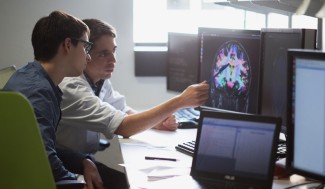The Paris Brain Institute, in partnership with the AP-HP, Sorbonne-Université, Medico-University Department of Neurosciences at the Pitié-Salpêtrière Hospital, with grant of €400,000 from the FIA Foundation - historical patron of the Institute with a focus on public health - and support from FIA, is launching a major study to rapidly and accurately assess all the potential neurological and psychiatric impacts of Covid-19 on affected patients, with the aim of improving patient management, follow-up and rehabilitation.
Covid-19 is a multi-targeted viral disease whose disorders caused by the virus surprise by the diversity of symptoms, sometimes atypical. In addition to the lungs, many other organs can be affected by Covid-19 and lead to neurological complications such as loss of smell, loss of taste, headaches, dizziness, convulsions, stroke, altered consciousness and hemiplegia. In addition, the respiratory difficulties observed in patients with Covid-19 may be due to brain stem involvement in addition to the lungs. This region, located between the brain and the spinal cord, contains the centres that control breathing. However, experts know little about the overall impact of this coronavirus on the central nervous system, even though more than 10 million people worldwide are currently affected by the virus.
The data collected will be the subject of in-depth analysis, notably using artificial intelligence. The information obtained will be exploited in real time in order to draw practical consequences for patients as quickly as possible by May 2021.
At the Paris Brain Institute, our mission is to find in order to cure. Therefore, the observations of our eminent specialists on this study will be decisive in helping people with Covid-19 to receive appropriate care. This ambitious project is led by the Neuroscience Medico-University Department at the Pitié-Salpêtrière hospital and the clinicians-researchers at the Paris Brain Institute, thanks to the FIA Foundation and the FIA, in favor of health for all. I would like to thank them very warmly.
Gérard Saillant, President of the Paris Brain Institute and President of the FIA Medical Commission.
The study will focus on:
- the neuropsychiatric manifestations of the affected individuals
- the psychiatric consequences for the patients themselves (due in particular to very long periods of resuscitation) as well as for their relatives
- the consequences for patients already suffering from neurological pathologies such as inflammatory diseases (including multiple sclerosis) and neurodegenerative diseases (such as Parkinson's and Alzheimer's).
The long-term effects of the coronavirus on health are only beginning to be understood, so this important project will provide vital information to share with the world. We at the FIA Foundation are proud of our longstanding relationship with the Institute and its cutting-edge research.
Saul Billingsley, Executive Director of the FIA Foundation.
The Paris Brain Institute is probably one of the few centres in the world that is able to provide a comprehensive view of the neurology and psychiatry of Covid-19 infection. In the medium term, this will enable us as health professionals to be prepared to face a new pandemic and to have all the weapons at our disposal to better fight it. We can also think that this infection, when it strikes brains already damaged by a neurodegenerative or inflammatory disease, could have unknown effects. It is very important to know whether we are going to observe very atypical developments, for example in patients being monitored for Alzheimer's disease or multiple sclerosis. There's still a lot we don't know.
Prof. Jean-Yves Delattre, Medical Director of the Paris Brain Institute and Director of the AP-HP-Sorbonne University Neuroscience Medico-University Department at the Pitié-Salpêtrière Hospital, Prof. Jean-Christophe Corvol, Scientific Director of the project and Dr. Delorme, Principal Investigator.







